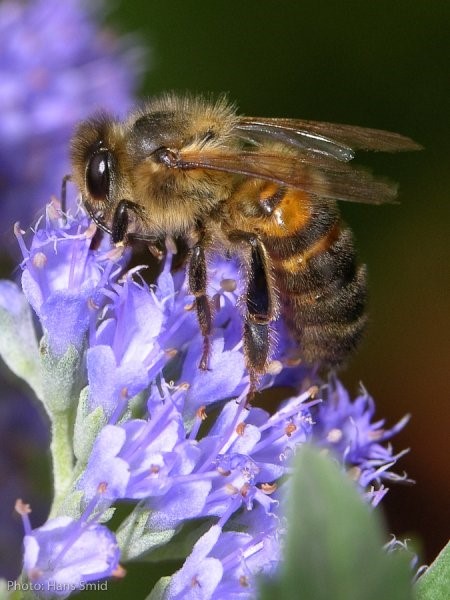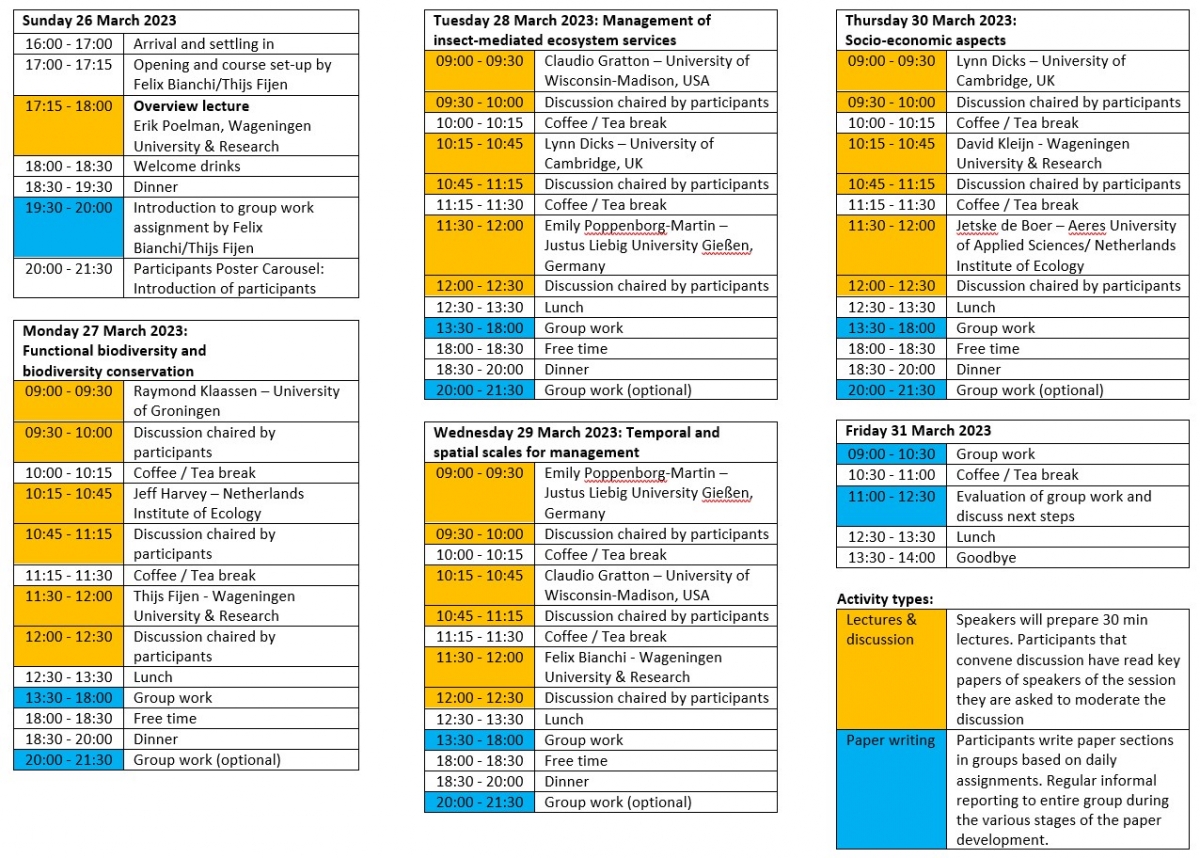What's Bugging You?
You are here

What's Bugging You?
How bugs support sustainable crop production and biodiversity
Sunday 26 - Friday 31 March 2023
Parkhotel de Bosrand, Ede, the Netherlands
Scope
 Insects, in diversity and numbers, host a significant component of the earth’s biodiversity that play an important role in systems functioning such as pollination, predation and acting as a food source. Likewise, insects provide valuable pollination and biocontrol services to support agricultural production. However, there is growing concern about insect declines, which have been associated with a range of factors, including intensive agricultural management practices and changing climate patterns. This notion has resulted in calls to conserve insect biodiversity and develop management strategies aimed at the conservation of insects and their environment that hence does not only conserve the insect diversity but biodiversity at large.
Insects, in diversity and numbers, host a significant component of the earth’s biodiversity that play an important role in systems functioning such as pollination, predation and acting as a food source. Likewise, insects provide valuable pollination and biocontrol services to support agricultural production. However, there is growing concern about insect declines, which have been associated with a range of factors, including intensive agricultural management practices and changing climate patterns. This notion has resulted in calls to conserve insect biodiversity and develop management strategies aimed at the conservation of insects and their environment that hence does not only conserve the insect diversity but biodiversity at large.
In this course, we will provide an overview of theory, concepts and approaches to conserve insects and the design of biodiversity-friendly agricultural landscapes. Aside from updating and deepening your scientific knowledge, this course also offers an excellent opportunity to broaden your network and to interact with world-class scientists in the field!
The focus of the course will be on:
- Functional biodiversity and biodiversity conservation
- Management of insect-mediated ecosystem services
- Temporal and spatial scales for management
- Socio-economic aspects
Course set-up
The course is composed of a keynote address, a poster carousel, a series of lectures and a joint paper writing exercise.
Poster carousel
After the Sunday dinner there will be a poster carousel during which participants present themselves, their research and interest in the course. The carousel will involve 6 sessions where approximately 6 posters will be presented. Prior to the course, participants will receive a poster format from the course office. After having completed the poster, it is submitted to the course office in PDF. The poster will be printed by the course office. Posters will remain in the lecture room throughout the course.
Lectures and discussion
Each day starts with 2 or 3 lectures by authorities on the topic of the day, covering both the general theory and applied aspects. After each lecture, a discussion is held, convened by the participants who challenge the speaker on the presentation and a paper. Participants receive the speaker’s paper prior to the course and formulate a question based on this paper. If the lecture has caused participants to want to rephrase or change their question, they will have time to do so just after the lecture.
Group activity
On Monday, Tuesday, Wednesday and Thursday afternoon, participants will collectively develop a review paper. Participants will be split in working groups of 4-5 members, that each day will receive an assignment to develop a section of the paper. The activity is supervised by the lecturers and course organizers, and there will be ample time for discussion and sharpening the content of sections. At the end of the week, we hope to have a full draft of the paper, which may be suited for submission to an international peer-reviewed journal.
Lecturers
Raymond Klaassen1, Jeff Harvey2 & Thijs Fijen3
Topic: Functional biodiversity and biodiversity conservation.
Because biodiversity is instrumental in the delivery of ecosystem services such as pest control and pollination, it is often used as an argument to convince farmers to protect biodiversity. However, not all species contribute equally to ecosystem delivery, and therefore we often talk about functional biodiversity in an agricultural context. There is still much debate about the relative importance of species to ecosystem service delivery, how many species are required for a sufficient delivery, and whether conservation of functional biodiversity also protects species that may be regarded ‘non-functional’ biodiversity.
Claudio Gratton4, Lynn Dicks5 & Emily Poppenborg-Martin6
Topic: Management of insect-mediated ecosystem services.
Farmers manage their crop fields at a daily basis to support a good crop performance. Fertilizing, weeding, spraying pesticides, and irrigation occurs with relatively clear guidelines (e.g. best management practices) and usually have predictable outcomes. However, insect-mediated ecosystem services are often less predictable, and therefore these can pose challenges for farmers who depend on these services to achieve satisfactory crop yields. In this session we discuss how important the managing for insect-mediated ecosystem services is, and how farmers can do this.
Emily Poppenborg-Martin6, Claudio Gratton4 & Felix Bianchi3
Topic: Temporal and spatial scales for management.
Species that contribute to the delivery of ecosystem services may have specific requirements, are mobile and are likely to show strong population fluctuations during the growing season. For example, species may require (food) resources that are available in different habitats at different times in the year. Management for insect-mediated ecosystem services should therefore consider the various spatial and temporal scales at which ecosystem service providers respond to the landscape. In this session we will discuss these complex spatio-temporal patterns, and appraise what the implications are for management.
Lynn Dicks5, David Kleijn3 & Jetske de Boer7
Topic: Socio-economic aspects.
When we consider the functions that agricultural landscapes should provide for society, we should reflect on the role of landscape management, our rural environment, people’s livelihoods and the various (and sometimes conflicting) opinions of stakeholders. Policy support, community based approaches, and ‘learning by doing’ are essential to support the transition towards more multifunctional and biodiverse landscapes. In order to effectively protect biodiversity, we need to take all these stakes into account, which comes with challenges and opportunities.
1 University of Groningen, The Netherlands
2 Netherlands Institute of Ecology, The Netherlands
3 Wageningen University & Research, The Netherlands
4 University of Wisconsin-Madison, USA
5 University of Cambridge, UK
6 Justus Liebig University Gießen, Germany
7 Aeres University of Applied Sciences/ Netherlands Institute of Ecology, The Netherlands
Programme

Course organisers
- Felix Bianchi (Farming Systems Ecology, Wageningen University & Research)
- Thijs Fijen (Plant Ecology and Nature Conservation, Wageningen University & Research)
- Claudius van de Vijver (Graduate School PE&RC)
General information
| Target Group | The course is aimed at PhD candidates, postdocs and other academics |
| Group Size | Min. 15, max. 30 participants |
| Course duration | 5 days |
| Language of instruction | English |
| Frequency of recurrence | Once every four years |
| Number of credits | 1.5 ECTS |
| Prior knowledge | An academic background with at least an MSc degree. |
| Location | Parkhotel de Bosrand, Ede, the Netherlands |
Fees 1
| EARLY-BIRD FEE 2 | REGULAR FEE 2 | |
| PE&RC / WIMEK / WASS / EPS / VLAG / WIAS PhD’s with a TSP | € 340,- | € 390,- |
| PE&RC Postdocs and staff | € 680,- | € 730,- |
| All other academic participants | € 760,- | € 810,- |
| Non-academic participants | € 1.100,- | € 1.150,- |
1 The course fee includes accommodation, all meals, course materials, coffee/tea, and water. It does not include beverages in the bar.
2 The Early-Bird Fee applies to anyone who REGISTERS ON OR BEFORE 27 JANUARY 2023
Note:
- If you need an invoice to complete your payment, please send an email to office.pe@wur.nl, including ALL relevant details that should be mentioned on the invoice (e.g., purchase order no., specific addresses, attendees, etc.).
- The Early-Bird policy is such that the moment of REGISTRATION (and not payment) is leading for determining the fee that applies to you.
- Please make sure that your payment is arranged within two weeks after your registration.
- It is the participant's responsibility to make sure that he/she (or his/her secretary) completes the payment correctly and in time.
PE&RC Cancellation Conditions
- Up to 4 (four) weeks prior to the start of the course, cancellation is free of charge.
- Up to 2 (two) weeks prior to the start of the course, a fee of € 340,- will be charged.
- In case of cancellation within two weeks prior to the start of the course, a fee of € 760,- will be charged.
- If you do not show at all, a fee of € 1.100,- will nevertheless be charged.
Note: If you would like to cancel your registration, ALWAYS inform us and do not assume that by NOT paying the participation fee, your registration is automatically cancelled, because it isn't (and do note that you will be kept to the cancellation conditions).
More information
Claudius van de Vijver (PE&RC)
Phone: +31 (0) 317 485116
Email: claudius.vandevijver@wur.nl
Registration
To register, please enter your details below and click "Register".
